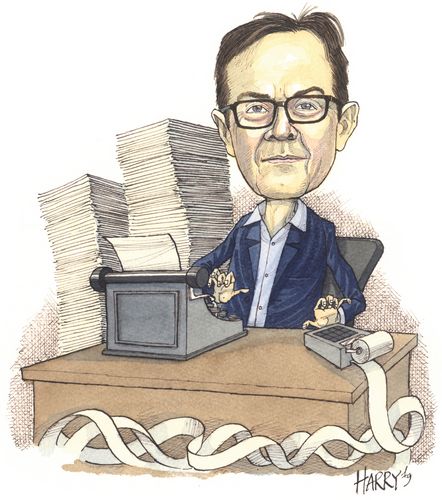Brexit turmoil has erupted with good timing for one former senior UBS debt markets banker: he has just released a book on 371 years of Britain’s relationship with Europe.
Stuart Sweeney worked in investment banking for 23 years, and said his new book – “The Europe Illusion” – benefited from him “wrestling with the challenges of the eurozone” during his career in capital markets.
Sweeney worked mainly on bond and derivatives desks, rising to head UBS’s corporate and public sector DCM team. Working through the emergence of the euro gave him a ring-side view of how sovereign funding works and tensions emerge in international markets.
“I saw the convergence aspects of Europe and I saw the Exchange Rate Mechanism crisis of the 1990s and then the advent of the single currency … and then its period of instability after 2009,” he recalled.
Sweeney’s book, his second, was released last month. It assesses the relationship between Britain, France and Prussia-Germany since the map of Europe was redrawn at Westphalia in 1648. European integration evolved through economic, diplomatic and cultural links cemented between the three big powers as wars became more destructive and economic expectations were elevated. The book shows setbacks have regularly occurred and can be manageable.
“The situation we’re currently in is not a unique situation and history has a unique habit of repeating itself. Conflicts between these three great powers have tended to be the rule rather than the exception,” Sweeney told IFR.
His lookback on history includes the influence of economist Adam Smith, Germany’s Zollverein customs union, the ups and downs of the euro and how in recent decades Britain’s semi-detached approach and a culture of “opt-outs” was creating problems by 2016.
“Britain was in the EU but not part of a lot of it … it was inevitably going to hit the buffers,” Sweeney said.
The book focuses on four themes – politics and wars; economics and trade; empire and migrations; and religion. Each theme is considered in its historical context but also linked to current events. One chapter on the economics of European integration, for example, charts the path from the creation of modern Germany in 1871 to economic and monetary union.
Sweeney said “full monetary union can only overcome internal contradictions if you have fiscal transfers. I think we’ll move in that direction”.
CITY DAYS
Sweeney was always interested in history and politics. He studied philosophy, politics and economics at Oxford University – the same course taken by scores of politicians, including David Cameron, Michael Heseltine, Edward Heath and Harold Wilson.
But after graduating in 1985 Sweeney went into finance and joined Kleinwort Benson, in fixed income origination in London and New York. Five years later he joined Paribas Capital Markets and helped build its UK fixed income desk.
In 1994 Sweeney joined Swiss Bank, which later became UBS Warburg. He mostly worked on interest rate and FX derivatives desks, looking after sovereigns and supranational clients. By helping the likes of Sweden and Ireland hedge rate and currency exposures he was at the heart of how sovereign risk and debt portfolios were managed at a crucial time in European markets.
In 2003 he went back to university full-time and completed a doctorate at Oxford on the economic history of Britain in India. He taught at Oxford and the Open University.
But he was coaxed back to UBS in 2009 after the Swiss bank was hit hard in the financial crisis and needed help.
UBS was restructuring and cutting costs, but also wanted some of the action in busy public sector and corporate debt markets and was also trying to reduce the capital usage of its assets. Sweeney led corporate and public sector DCM.
He left UBS in 2014 and started his book on Europe in 2015. But a year later his wife died. The book took three years to write, while he was teaching at Oxford.
After his wife’s death he also volunteered to work in the social investment wing of UK charity Oxfam, getting to know the market for social investment, which uses money for both a social and financial return.
Sweeney is now senior investment manager at CAF Venturesome, the social investment arm of the Charities Aid Foundation. It provides financial support and advice to charities, donors and companies so they can get more bang for their buck. It lends, invests in and supports organisations, such as a charity providing healthy meals to schoolchildren and another tackling homelessness by offering training and education. Loans are typically £50,000 to £400,000 and made over three to five years.
HISTORY LESSONS
Sweeney said his next history book might draw more on his experiences in the City.
His first book was released in 2011 during his second spell at UBS and was a history on the financing of Indian railways, and drew on his banking know-how.
“Some of the financing vehicles used then [19th Century India] were complex. They often had optionality in them or payment structures that were very sophisticated structures. It tells us we’ve been here before,” Sweeney said.
He has some ideas for the next book, but has not started anything yet.
“I’d like to take a look at some of the episodes in recent decades and the financial crisis,” he said.
It could look at stories that are emblematic of the over-leveraged deals of recent decades.
“There’s a conjuring trick the financial markets tend to play away from the public gaze,” Sweeney said.
“Financial markets are so complicated and opaque. It might be interesting to examine with a couple of cases whether the 1980s culture has ever gone away. I’m not sure it has.”
